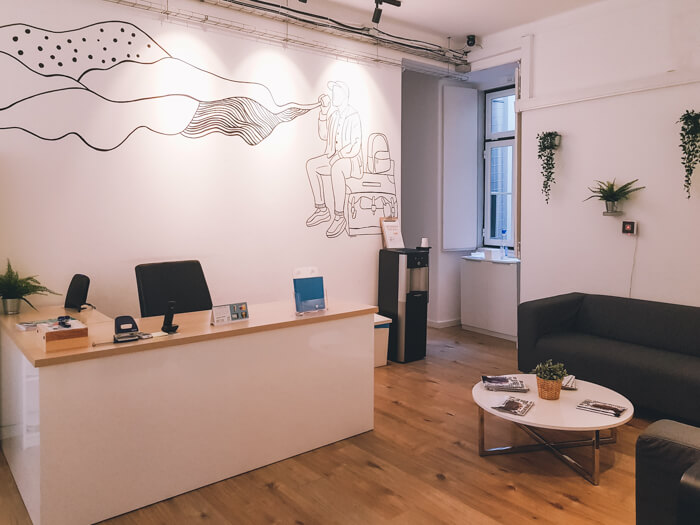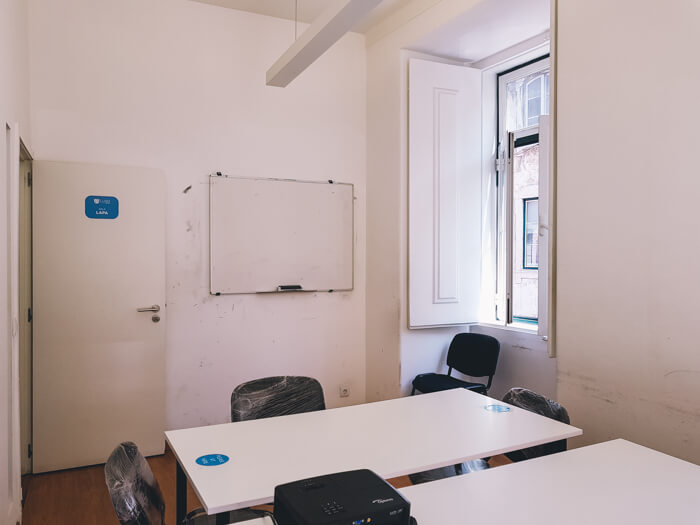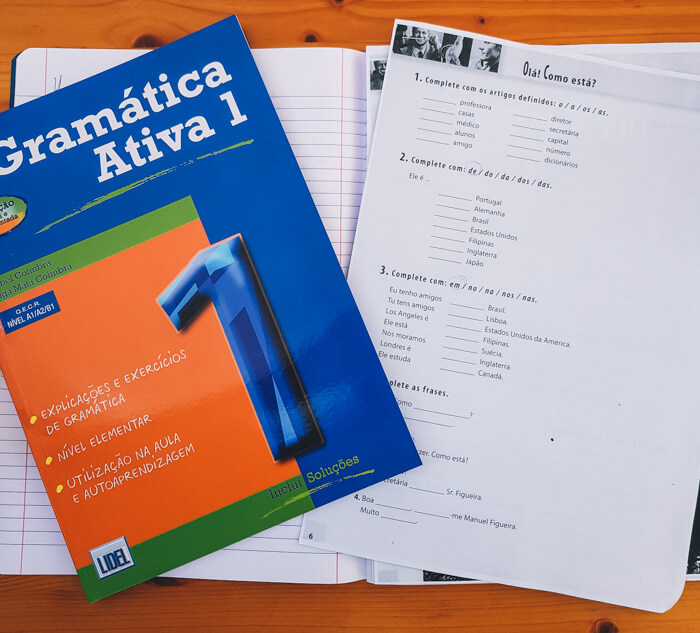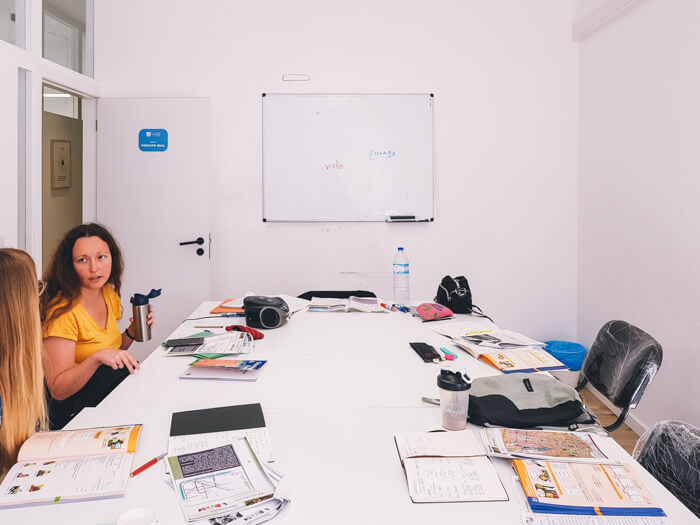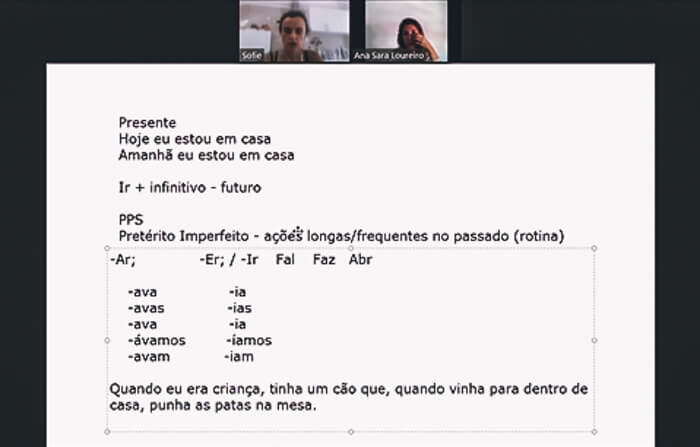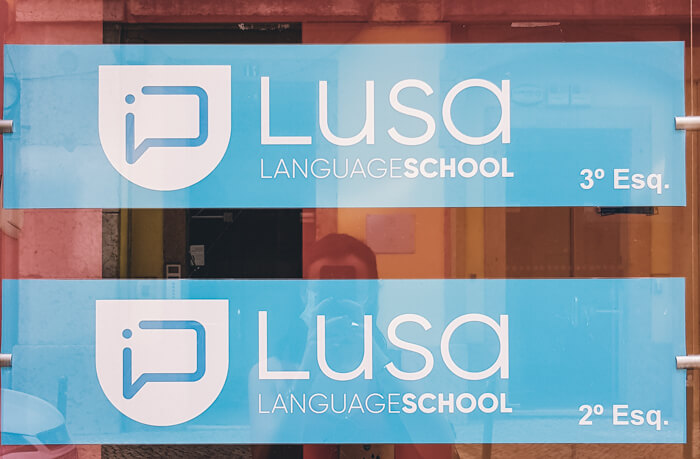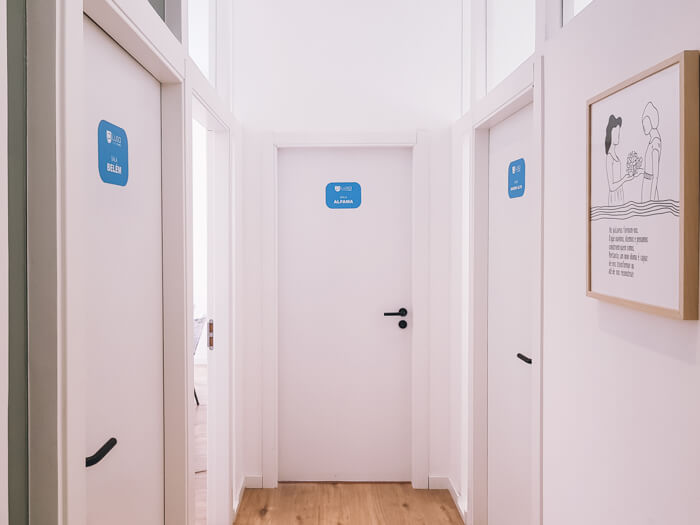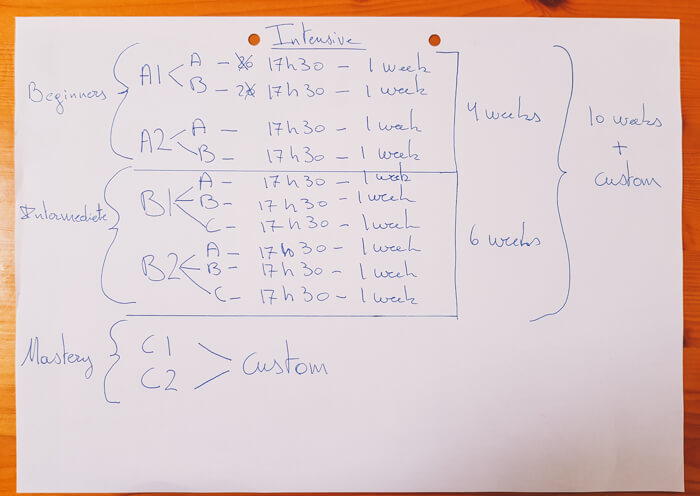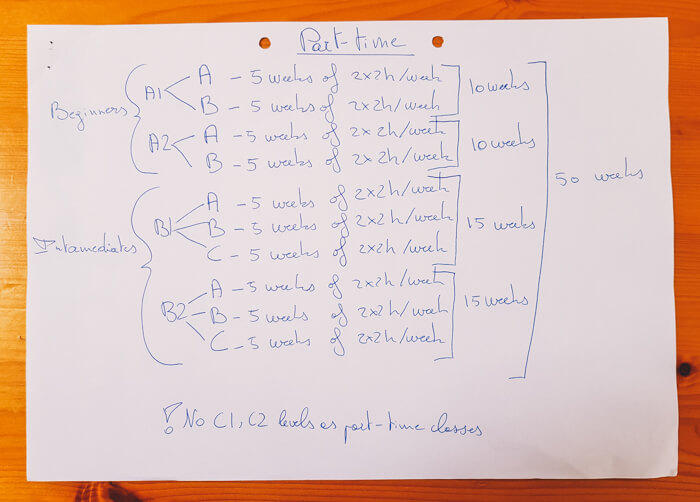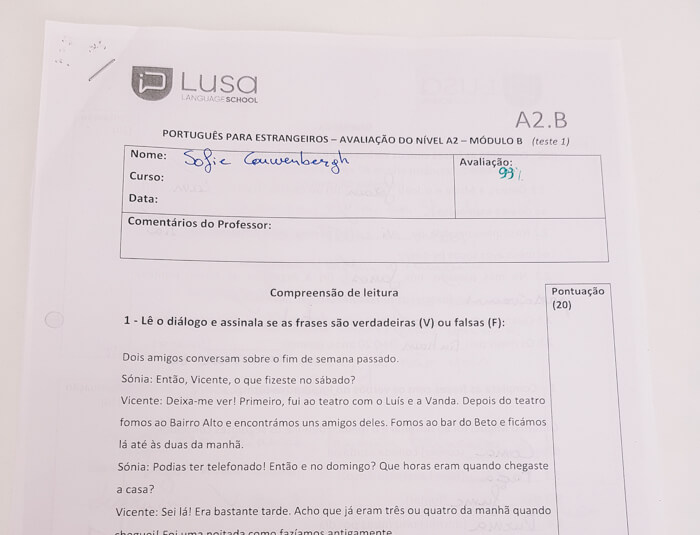When I set out to find a new base – a new home – abroad, I knew that whichever country I’d end up in, I’d want to learn the language. Language is communication, and I believe that knowing the local language is not only a way to improve your experience in a place, but also to show locals that you’re willing to invest in becoming a part of their communities.
And so, I went in search of a language school where I could learn Portuguese in Lisbon.
- Whether it’s worth it to get the Lisboa Card for a few days of sightseeing.
- Where to treat yourself to a nice hotel with swimming pool in Lisbon center.
- Where to get the best pasteis de nata in Lisbon.
- Where to go on a fun Day trip from Lisbon.
Some people start learning Brazilian Portuguese even when they’re in Portugal because online apps and other teaching platforms have a larger offer of Brazilian Portuguese. It’s important to know that there are quite some differences between the two language versions and I recommend considering carefully which one you’ll learn depending on your long-term goals.
If you want to live in Portugal, it doesn’t make sense to learn Brazilian Portuguese.
Different ways to learn Portuguese in Lisbon
From casual individual classes with freelance teachers to complete programs in language schools, there are quite a few ways to learn the Portuguese language in Lisbon and what will be the best fit for you will depend on your availability and prior knowledge of the language.
I chose to go to a language school because I’d heard so many stories of expats in Portugal and elsewhere who decided to start learning the language on their own or through casual private lessons and then gave up mid-way or never even properly got started.
I knew that having to go to school, having to be in class, having to do homework, and following a fixed curriculum would have me make progress fast and in a consistent way and so I chose to sign up for an intensive course.
Language schools in Lisbon
There are a few places where you can take Portuguese courses in Lisbon. Some are proper language schools, others are universities or normal schools that also offer language courses.
I chose to work with Lusa School.
My choice: Lusa Language School
The reasons I chose to learn Portuguese with Lusa were the following:
- They offer a wide variety of Portuguese courses and so I knew that if I wanted to continue on a less intensive basis after my initial course, I would be able to do so with them as well.
- Their staff is super responsive and offered guidance on how to put together the best program for me personally.
- They offer the opportunity to start group classes every Monday, so you never have to wait weeks before you can start learning Portuguese.
- They get great reviews online and were recommended to me by several other people.
- They ensure the safety of their students by having everyone wear a mask, taking everyone’s temperature upon entering the school, making disinfect readily available, and more.
- Lusa Language School is located in the central and popular area of Cais do Sodre. I could walk there from my apartment and it would be easy to meet up with people and do other things after class.
You can find out more about the different types of group and private Portuguese lessons Lusa offers on their website.
Below, I’ll go into the three types of Portuguese classes I have taken with Lusa.
Intensive course
I wanted to dive right into the Portuguese language and so I chose Lusa’s Intensive Portuguese Course to get started. This course entails 3.5 hours of Portuguese per day from Monday until Friday either in the morning (9 – 12.30 am) or the afternoon (14 – 17.30 pm).
You can choose whether you sign up for morning or afternoon classes and in the rare case that you’re the only student signed up for your level at your chosen time of the day, the school will work with you to find a solution that fits your schedule. You’ll always be able to take classes at the time of day that works best for you.
When you enroll for the intensive course, you receive a grammar book as well as ample photocopies with exercises.
What I love about the Portuguese Intensive at Lusa is that you learn Portuguese based on everyday situations. You’re not asked to memorize a long vocabulary list or just cram grammar rules in your head.
Instead, you learn how to present yourself, order at a restaurant, go to the store, make an appointment, … and it’s through the presentation of these situations that you gather the tools you need to use Portuguese “out on the streets” and not just in the classroom.
The classes have a good mix of reading, writing, listening, and speaking exercises so that you get to practice all aspects of language learning.
I especially appreciated how the teachers continuously corrected our pronunciation. Correctly pronouncing Portuguese as a non-native speaker is hard but the teachers don’t settle for simply understanding what you’re trying to say – they make sure you say it the right way.
Lastly, the pace of the classes is quite high which means that you learn a lot fast. I could order food and have a very basic conversation in Portuguese after just one week of classes which I thought was amazing.
It also means that if you want to, there is plenty of material for you to revise every day and to practice with during your free time.
Every Friday, during the second part of that day’s class, you get a revision of the things you’ve seen that week and a little test to check where you’re at.
At the end of the course – which is whenever you decide to stop taking classes – you receive a certificate of attendance. If you need to take an official Portuguese exam for residency or work purposes, the school can also provide information and guidance on how to do that.
Private Portuguese lessons
You can take private lessons with Lusa both online and in person. I chose to take my classes online so I could better fit them into my schedule. There was one teacher I really liked, and so I asked the school if I could get my private lessons with her. We decided on dates and times and that was it. Everything was arranged in just a few emails.
My thoughts on my private classes:
- Private classes allow you to practice speaking more and better, as you enter into a conversation with the teacher rather than answer questions in a group setting.
- You both get to learn new things and work specifically on those things you struggle with, which makes it so that your overall mastery of the language grows faster.
- Since you likely won’t book 17.5 hours of private classes in a week (the number of hours you have class during the Intensive Portuguese Course), you are required to study Portuguese more on your own, which means you need to be a little more determined to put in the time than when you’re taking group lessons.
Part-time evening classes
Once I finished my five weeks of intensive classes, I added on another five weeks of part-time evening classes. These classes take place twice a week, either on Monday and Wednesday or on Tuesday and Thursday, and are two hours per evening.
The material used is the same as that of the intensive classes but of course, you progress more slowly as you’re only in class for four hours a week. This means that you also need to put in more work practicing outside of the classroom, especially if you want to become a more fluent speaker.
I think the evening classes are great when you’re going to school or working during the day, but I personally preferred the faster pace of the intensive classes.
Extracurricular activities
In normal times, Lusa organizes a lot of extracurricular activities throughout the week for its students. Because of COVID-19, those activities are temporarily suspended.
In-person language learning during COVID-19
Lusa has several measures in place to ensure the safety of students taking in-person classes at the school:
- Everyone needs to wear a mask, both staff and students.
- Everyone needs to disinfect their hands upon entering the school.
- Everyone needs to have their temperature checked upon entering the school.
- Fabric-covered chairs are wrapped in plastic foil for easy cleaning and disinfecting.
- All facilities are cleaned and disinfected on a daily basis.
- Windows in classrooms are kept open to ensure circulation of fresh air.
- Student seats are marked to ensure as much spacing as possible.
Practical information + speed of progress
You can find all practical information on how to learn Portuguese with Lusa, which Portuguese courses they offer, and how to sign up, on the Lusa website.
What is not on there and what thought could be interesting is an overview of how many weeks it would take you to go from the absolute beginner level to a C2 complete mastery of Portuguese. I asked Lusa to break it down for me and they gave me these process tables of how you can expect to advance when taking either the intensive course I took or their twice-weekly evening classes.
Before you have a look at these, it’s important to know that how quickly you’ll progress depends largely on how fast you learn and which languages you already know. If you have some knowledge of, for example, French and Spanish, you’ll pick Portuguese up much faster than if you speak English and have never learned a second language.
Lusa tracks the progress students make, not just by doing weekly tests but also by gathering feedback from teachers. When the school feels like a student is struggling, they’ll talk to that student and they might advise them to take some private classes and/or redo a certain level.
At the same time, when they feel a student is making progress quickly, they might offer them to skip a level.
So while the intensive course consists of 10 weeks to get from A1A to B2C level, it might take you a little longer or a week less depending on your existing language and learning skills.
It’s also good to know that there is no set time frame for getting from C1 to C2 and for mastering the C2 as the work still required at that point depends highly on every student.
My experience studying Portuguese at Lusa
When I started my classes at Lusa, I spoke zero Portuguese and now I can have basic conversations with Uber drivers, order food at restaurants, ask and answer questions when I go shopping, talk about my travels, and more.
My goal was to be able to have a 30-minute conversation before Christmas, and I achieved that.
I still have a long way to go but I honestly never thought I’d be speaking the way I am now before I got started. It also helps that Portuguese people, in general, seem to be super friendly toward people learning their language. While they’re quick to switch to English when they hear you’re a foreigner, they often times also gladly continue the conversation in Portuguese and make an effort to speak slowly if you ask them to.
Over the course of the five weeks that I took the intensive classes, I had three different teachers, all of which had their own style, as well as a private class with a fourth. My part-time evening classes were all with the same teacher, as the five weeks I did, covered one level.
It’s been interesting discussing the classes with my co-students and noticing how everyone’s learning preferences are a bit different. This is normal. Everyone has their own style of learning and you’ll pick up some things more quickly than others.
That being said, while all teachers add their own “sauce” to the class, they also all use the same course material, and classes progress in quite a similar way.
Do you want to learn Portuguese in Lisbon? Make sure to check out the Lusa website and let me know in the comments!
Lusa provided me with my language classes so that I could write this review for you. As always, all opinions expressed here are my own. Feel free to reach out should you have any questions.


